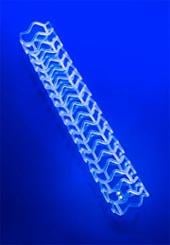
December 9, 2011 — Abbott announced Thursday the initiation of ABSORB II, the first randomized, controlled, multi-center clinical trial evaluating the safety, efficacy and performance of the Absorb bioresorbable vascular scaffold (BVS). The Absorb BVS will be compared to the company's Xience Prime everolimus-eluting coronary stent system.
Approximately 500 patients with coronary artery disease will be enrolled at about 40 investigational sites in Europe and New Zealand. The first patient was enrolled by Philip MacCarthy, M.D., consultant cardiologist and clinical lead; and Jonathan Hill, M.D., consultant cardiologist, at King's College Hospital in London.
Absorb is a bioresorbable scaffold designed to treat a patient's blocked vessel and then fully dissolve, leaving the vessel free of a permanent metallic implant. Because a permanent implant is not left behind, naturally occurring vessel functions may be restored. The device has CE Mark and is authorized for sale in Europe for the treatment of coronary artery disease. In the United States, it is currently investigational and not available for sale.
"Absorb has the potential to be an important advancement in the field of interventional cardiology, as clinical trials of this dissolvable device to date suggest that a permanent implant may not be needed to restore and maintain blood flow to the heart," said Patrick W. Serruys, M.D., Ph.D., professor of interventional cardiology at the Thoraxcentre, Erasmus University Hospital, Rotterdam, the Netherlands and primary investigator for the ABSORB II clinical trial. "The ABSORB II trial is designed to test unique endpoints to determine the differences between Absorb and a permanent metallic implant, which may provide us with valuable insight into the potential uses of bioresorbable technology in patients with coronary artery disease."
Patients will be randomized at a ratio of 2-to-1 (Absorb to Xience Prime). The primary endpoints of the trial are change in dimension of the lumen (interior of the vessel) over time and vasomotion (vessel movement) at the treated vessel segment; they will be assessed based on changes in the vessel diameter in response to a stimulus.
Clinical endpoints, including death, myocardial infarction (heart attack), target lesion revascularization, and scaffold/stent thrombosis, will be assessed at 30 and 180 days and at one, two and three years post-treatment. Quality-of-life measures will be assessed prior to treatment, at 180 days and at one, two and three years post-treatment.
"ABSORB II is the first head-to-head study to test our Absorb device compared to Xience Prime, a drug eluting metallic stent, in patients with coronary artery disease," said Charles A. Simonton, M.D., FACC, FSCAI, divisional vice president, medical affairs, and chief medical officer, Abbott Vascular. "This is also the first trial to evaluate clinical endpoints that may be unique to a bioresorbable device, such as measuring the ability of the vessel to respond to normal blood pressure changes. The potential to restore a treated vessel back to a more natural state will also be assessed in this trial."
Absorb is made of polylactide, a proven biocompatible material commonly used in medical implants such as dissolvable sutures. Studies to date have shown the device restores blood flow by opening a blocked vessel and providing support to the vessel until it dissolves after approximately two years.
Abbott has completed one clinical trial called ABSORB and currently is conducting a second trial called ABSORB EXTEND to evaluate the device for the treatment of coronary artery disease. It is a large-scale, single-arm study that will evaluate Absorb in patients at up to 100 centers in Europe, Asia Pacific, Canada and Latin America. The trial will enroll approximately 1,000 patients with complex coronary artery disease.
For more information: www.abbott.com


 January 05, 2026
January 05, 2026 









